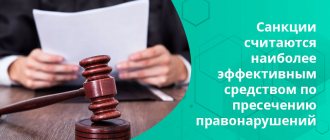Legal and factual error: types, characteristics and criminal legal significance
Error
represents an incorrect assessment by the person committing the crime of his behavior, the actual circumstances of the crime, the consequences, the conditions of illegality, etc.
There are two types of errors:
- legal errors
are a person’s incorrect understanding of the legal essence or legal consequences of the act he commits; - factual errors
are a person’s incorrect assessment of factual circumstances, which are objective signs of an act, mandatory elements of a crime.
Types of legal error:
- an error regarding the wrongfulness of an act is expressed in a person’s misconception:
- about the criminality of his act
- the person believes that his actions are criminal and entail criminal liability, but are not provided for by the Criminal Code of the Russian Federation; - non-criminality of his act
- the person believes that the act he commits does not entail criminal liability, but the Criminal Code of the Russian Federation considers such an act a crime; - error in the qualification of the act
- the person is mistaken in the criminal legal assessment of the act; - error regarding the type and amount of punishment for a crime.
Such an error does not affect liability, since the type and amount of punishment are beyond the subjective side, and does not affect either the qualifications or the amount and type of punishment determined by the court.
Types of factual error:
- error in the object
- consists of an incorrect understanding of the person committing the crime about the content of the object of the attack as a mandatory element of the offense; - error in an object
- a misconception regarding the properties and materially expressed characteristics of an object. An error in an item that is a mandatory element of the offense affects the qualification of the offense. An error in a subject that is an optional element does not affect the qualification; - mistake in the identity of the victim
- lies in the fact that the subject, wanting to cause harm to one person, as a result of a mistake, causes harm to another person. Actions in such cases are qualified as a completed crime; - error in the nature of the action or inaction performed.
This kind of error can be of two types:- the person does not consider his actions (inaction) dangerous and entailing criminal liability, although they are recognized as a crime by the Criminal Code of the Russian Federation;
- a person considers his actions (inaction) to be socially dangerous, but in reality they are not - responsibility comes for attempted crime;
- an error regarding the signs characterizing the objective side
may consist of an error regarding the quantitative or qualitative characteristics of socially dangerous consequences.
An error regarding the quantitative characteristics of the consequences does not affect the qualification of the offense if this error does not go beyond the limits established by the legislator.
An error in the qualitative characterization of consequences may include:
- in failure to foresee harm that actually occurred, liability for an intentional crime is excluded;
- in anticipation of harm that did not occur, liability may arise for an attempted crime (if there is direct intent).
Lawyers discuss the right to professional error and responsibility for it
According to the press service of the FPA, on February 14, the XVI International Scientific and Practical Conference “Kovalev Readings” started in Yekaterinburg, organized by the Ural State Law University, the Federal Chamber of Lawyers, the Federal Notary Chamber, as well as the group of legal and KA Regionservice.
The main topic of the 2021 conference – the right to professional error and responsibility for it – relates to a complex area where many branches of law intersect. And the more difficult it is to develop a general legal approach, the more difficult it is to determine in each specific case the line beyond which a person’s right to make mistakes ends and his obligation to bear responsibility for the mistake begins.
At the opening of the conference, Chairman of the Federation Council Committee on Constitutional Legislation and State Building Andrei Klishas announced a greeting from the head of the Federation Council Valentina Matvienko to the participants and guests of the conference. “Kovalev Readings,” the greeting notes, have been for many years a platform that brings together leading scientists, representatives of the legal community, and government agencies to discuss important issues of law and law enforcement practice.
The main report of the conference “Error: concept, properties, types” was made by Honored Scientist of the Russian Federation, Doctor of Law, Professor, Head of the Department of Criminal Law of the Ural State Law Institute Ivan Kozachenko.
Analyzing the essence of error as a phenomenon, he admitted that “an error is an inevitable, unpredictable result of a person’s assessment (subjective factors) of certain circumstances (including the results of his actions), which he, in good faith, was mistaken, assumed to be exclusively legitimate or negative and which, however, they did not turn out to be so.”
Next, Ivan Kozachenko focused on a set of criteria that make it possible to define a particular phenomenon of reality as an error, and the classification group of errors, which are the subject of panel discussions at the Kovalevsky Readings - 2019.
The first property is imperative: “Nature, as a material principle, is in itself infallible, since it creates itself according to the laws of nature, and not at the behest of consciousness, will and human actions. Many natural disasters, known to man not only on the basis of past events of past times, but also often from his own bitter experience, end with tragic consequences that are colossal in their destructiveness.”
The second property is universal: “An error is a creation of exclusively conscious (physical and/or spiritual activity) of a person. The basis of such an error is of a stable nature, since the measured and complacent natural rhythm seems to lull a person’s everyday (everyday) vigilance, often forming in him doubt about the need to worry, to “be on the alert” in order to be at least one step ahead of fatal events.”
The third property is interacting: “It can be assumed that an error does not arise on its own, it is the result of the interaction of a person with nature (matter) or a person with similar creatures.”
The fourth property is material: “An error takes on a certain meaning only if there are certain negative consequences of a material nature.”
The main content of the conference panel discussions are medical and judicial errors, business errors, professional errors in lawyering and notarial activities.
Ivan Kozachenko defines them as follows:
- medical error - “a negative, actually occurring result of a conscious (physical and/or intellectual) interaction between a doctor and a patient as part of his treatment or conducting a medical experiment with him, the occurrence of which, according to the calculations of the person treating or conducting the experiment, was impossible”;
- miscarriage of justice - “a negative, actually occurring result of the conscious intellectual interaction of a judge with persons participating in the case, within the framework of a civil case considered by him or with participants in criminal proceedings within the framework of a criminal case considered by him, the occurrence of which, according to the calculations of the judge, was impossible”;
- business mistake - “a negative, actually occurring result of the conscious intellectual interaction of a businessman with his business partners, the occurrence of which, according to his calculations, was impossible”;
- professional error in lawyering is “a negative, actually occurring result of a lawyer’s conscious professional interaction with his client (his clients), the occurrence of which, according to his calculations, was impossible”;
- professional error in notarial activity is “a negative, actually occurring result of a notary’s conscious professional interaction with his client (his clients), the occurrence of which, according to his calculations, was impossible.”
What is an accountant's accounting error?
There is no definition of counting error in the law. Rostrud, in a letter dated October 1, 2012 No. 1286-6-1, indicated that a counting error is an arithmetic error that was made during the calculation.
That is, a counting error is one that arose in the process of arithmetic operations carried out by an accountant when calculating benefits: addition, multiplication, subtraction, division.
Previously on this topic:
What is a counting error
Countless mistakes
Errors that are not directly related to the calculation cannot be attributed to the calculation and on this basis cannot be attempted to return the overpayment.
For example, paying benefits twice
do not apply to arithmetic operations. This overpayment is due to the accountant's carelessness, so an accounting error is not considered. This conclusion is enshrined in the Ruling of the RF Armed Forces dated January 20, 2012 No. 59-B11-17.
Judges adhere to this position in most decisions. For example, in the ruling of the Sixth Court of Cassation of General Jurisdiction dated 04/30/2020 in case No. 88-10480/2020, in the appeal ruling of the Sverdlovsk Regional Court dated 02/16/2018 in case No. 33-3337/2018.
Program crash
also does not apply to counting errors.
According to Rostrud and the judges, the accountant must check the accrued amount before making a payment, and not rely on the actions of the program.
In this regard, the recently published decision of the Eighth Court of Cassation of General Jurisdiction dated April 22, 2021 No. 88-6389/2021 is indicative.
The software failure was not considered a counting error by the judge of the St. Petersburg City Court in the appeal ruling dated July 17, 2018 No. 33-13081/2018, and the Murmansk Regional Court in the Appeal ruling dated July 22, 2015 No. 33-2153-2015.
Having recognized the software failure as a counting error, the judges expressed a different opinion,
- Belgorod Regional Court in the appeal ruling dated 03/05/2019 No. 33-1555/2019.
- Omsk Regional Court in the appeal ruling dated April 26, 2018 in case No. 33-1865/2018.
- Khabarovsk Regional Court in the appeal ruling dated November 28, 2016 No. 33-8775/2016.
The above decisions state that in the conditions of automated calculation, a counting error may also include an error that occurs as a result of an incorrect program algorithm or its failure.
Incorrect interpretation of legislation cannot be considered a counting error.
when calculating benefits. The FSS drew attention to this in a letter dated November 30, 2015 No. 02-09-11/15-23247.
Accountants using incorrect source data
, it will also be difficult to attribute to counting errors: the appeal ruling of the Orenburg Regional Court dated 02/07/2018 in case No. 33-950/2018.
Errors that courts most often do not classify as counting errors:
- Payment of benefits to an employee twice due to the fact that the amount previously paid was not taken into account.
- Use of incorrect initial data in calculations.
- The wrong coefficient was applied.
- The number of days for payment of benefits was incorrectly calculated.
- Incorrect calculation due to the algorithm embedded in the program.
- The accounting program crashed due to a technical malfunction.
- Erroneous interpretation of legal norms.
- The calculation of average earnings included the bonus accrued after the billing period.
- A salary supplement not established for the employee was applied.
- The bonus was awarded by mistake without the director's order.
- The money was transferred to the namesake's card.
How to avoid mistakes as a lawyer in your work
When turning to a lawyer for advice and direct assistance in civil disputes or arbitration, the client hopes to cooperate with a competent specialist who understands and is oriented in the legislative nuances of the law.
From our experience, it was just “trash” that the proceedings on lease agreements with the Moscow Trading Office were there, everything that could be foreseen was there, and it was a very “heavy” document, both for lawyers and even more so for businessmen - tedious reading.
Learning is light and ignorance is darkness
However, lawyers are also people; they cannot know and be able to do everything. To create a reputation as a knowledgeable and competent person, it is not enough for a holder of a higher legal education to obtain a diploma. Even after graduating from an educational institution, a lawyer is simply obliged to improve and develop himself as a specialist, and try to avoid common mistakes in legal practice.
Of course, at first it is difficult for a specialist without experience in law to understand all the nuances and subtleties of legal activity; legal errors are possible. Helpers in such a situation will be news from judicial practice, clarifications, information and communication on legal forums and blogs, and so on.
In any professional activity, in addition to general skills and requirements for the specialty, there are so-called “working nuances”, the observance of which will allow you to avoid unpleasant or difficult situations. There are two ways to learn about “working moments”: from your own experience, through trial and error, or taking into account the recommendations and advice of knowledgeable and experienced people.
Don’t be afraid to make mistakes, it’s like the saying goes, it’s better to ask and be embarrassed than to live with the shame of not knowing.




